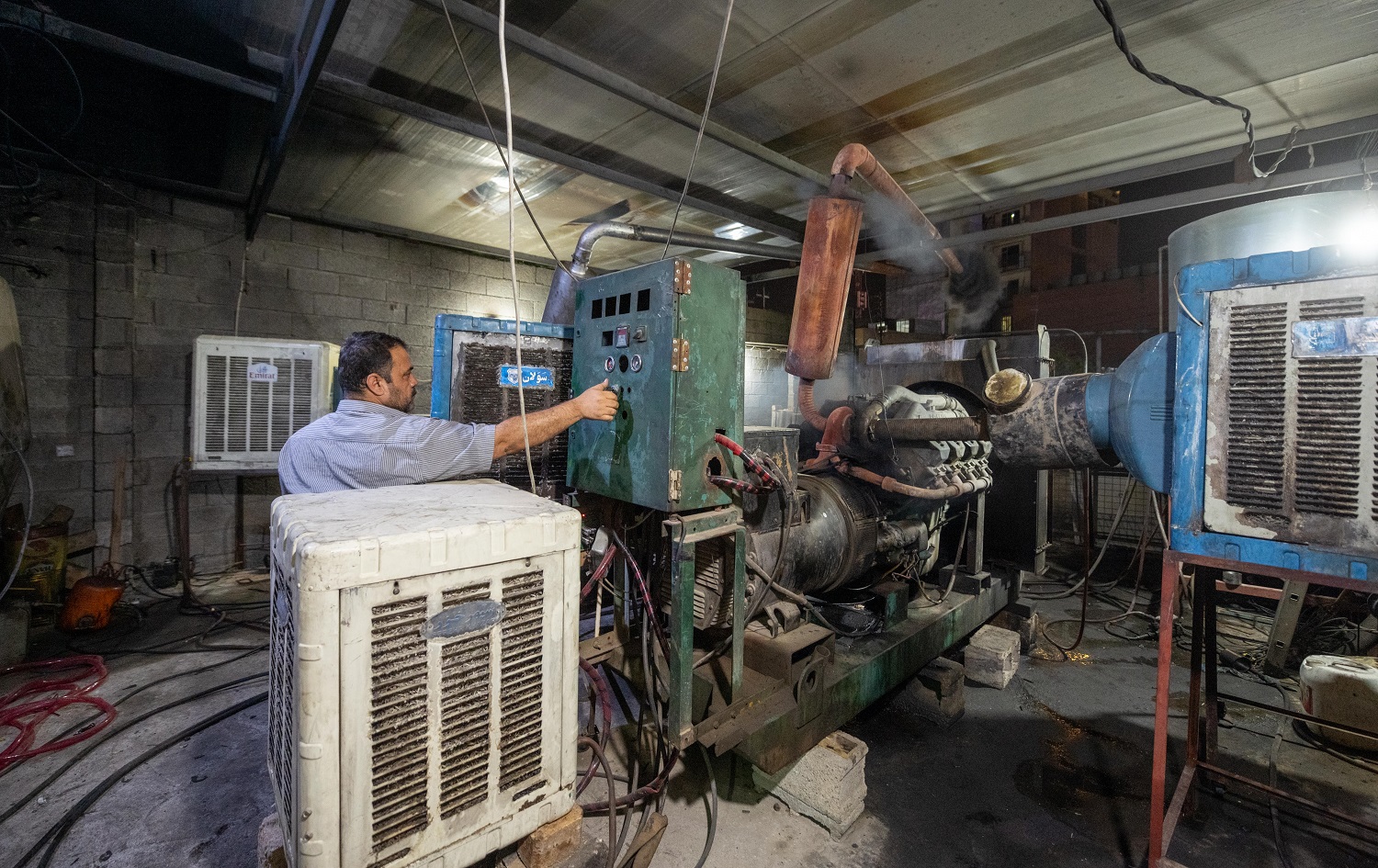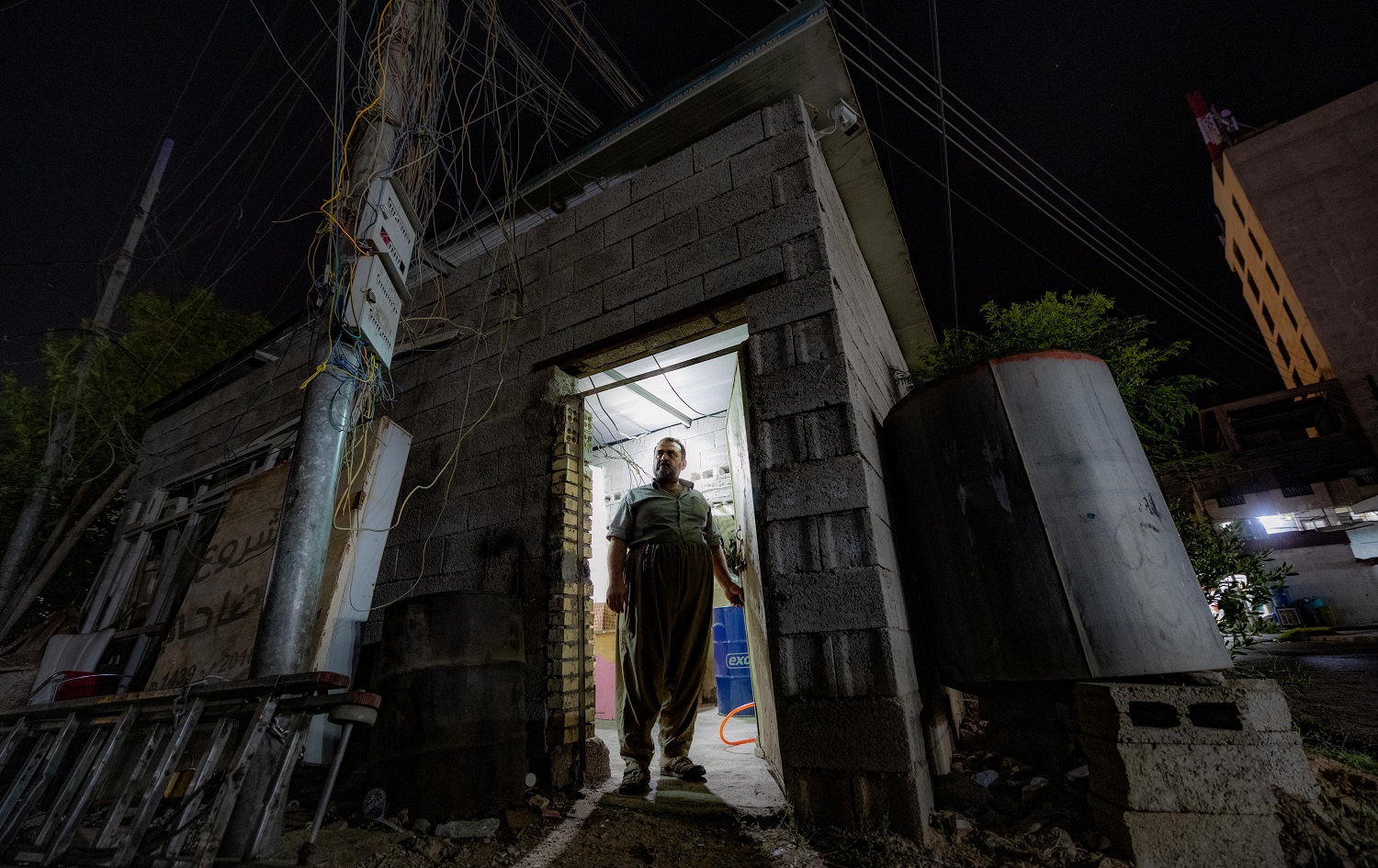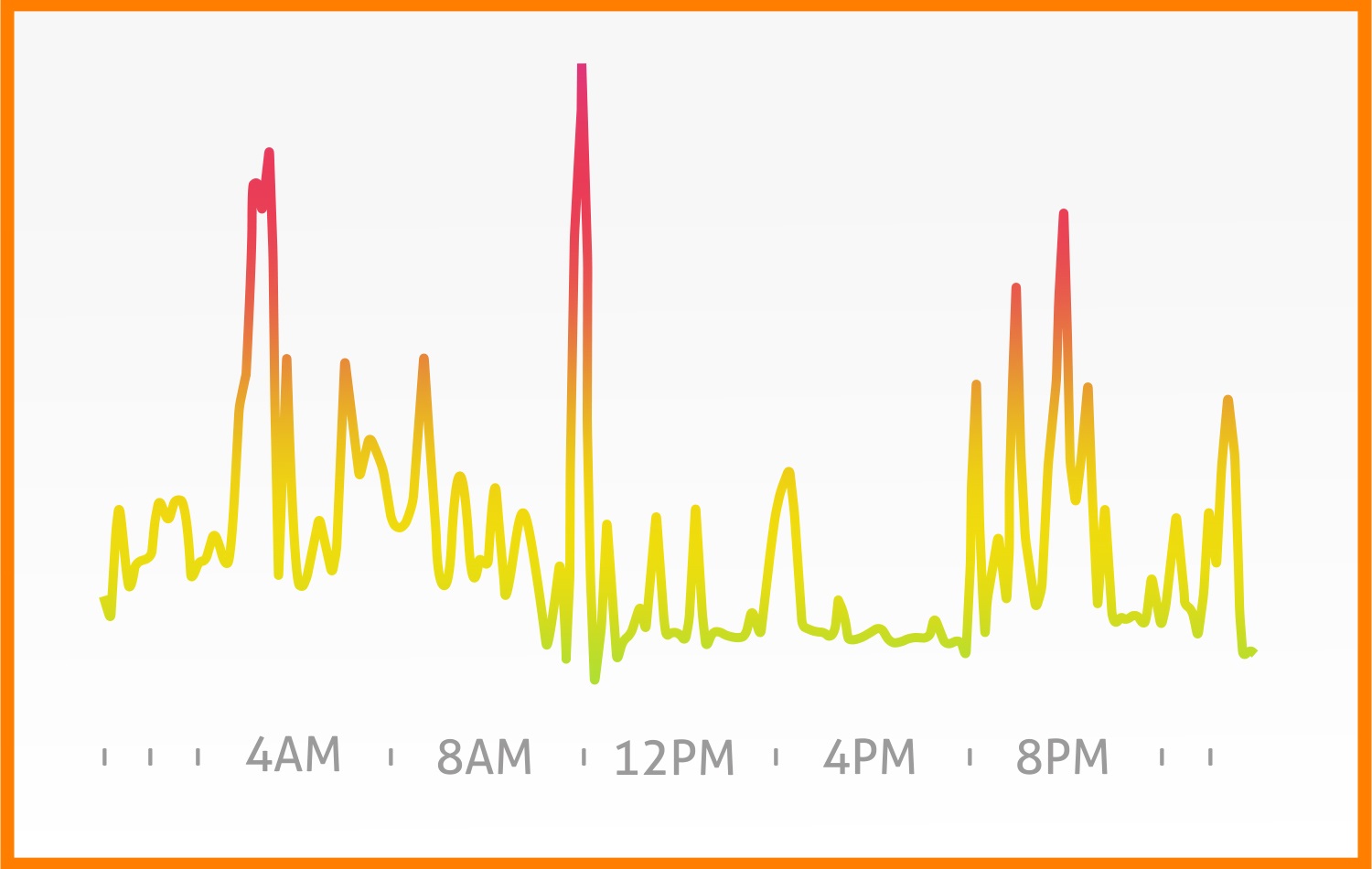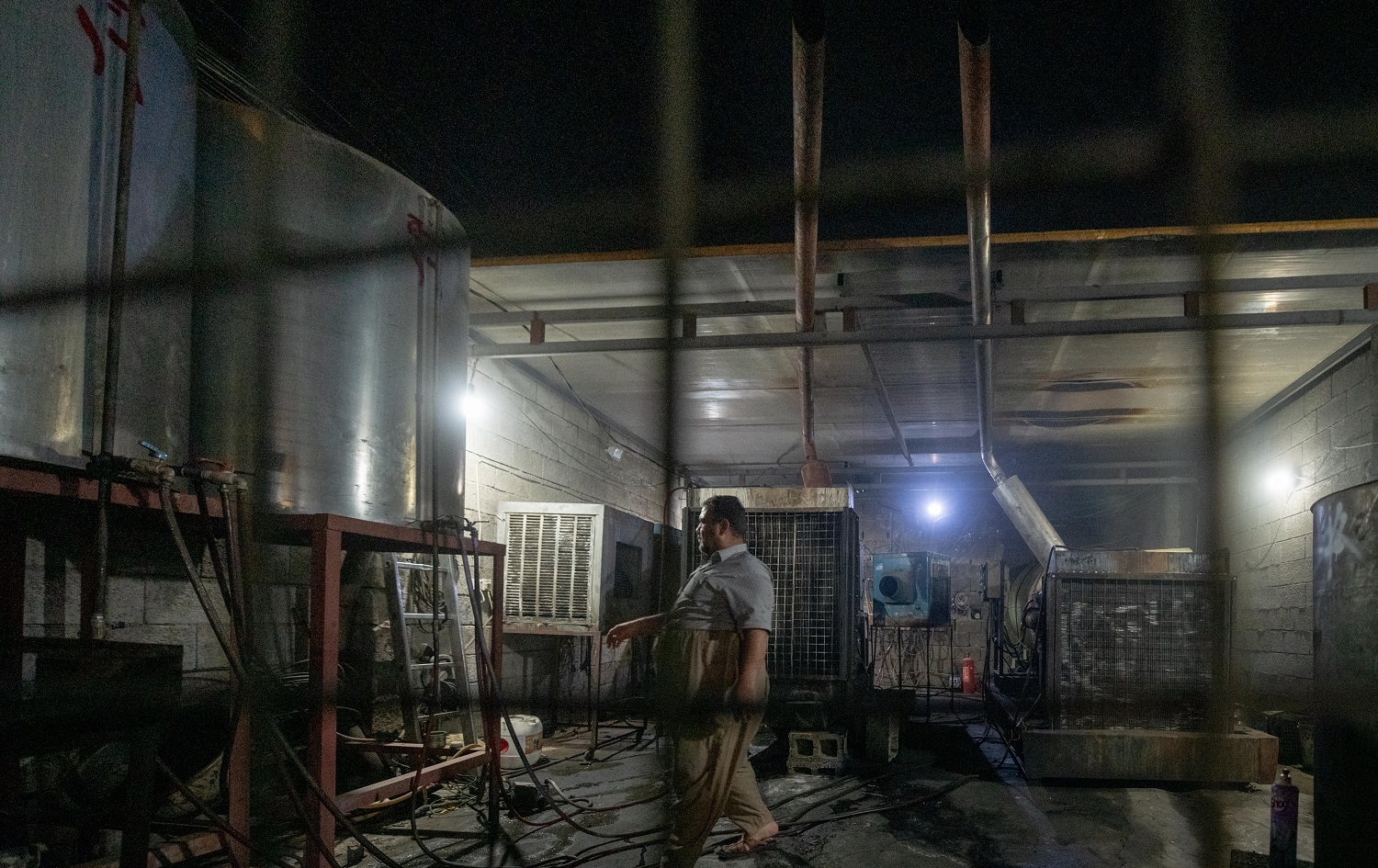
Generator operator Ghazi Rasheed maintains a neighbourhood generator in Kuran Ankawa, Erbil on August 10, 2020. Photo: Bilind T. Abdullah / Rudaw
ERBIL, Kurdistan Region — In the shadow of a three-walled cinder block shack housing a generator in Erbil, Ghazi Rasheed’s phone won’t stop lighting up. He fields calls from distraught and angry customers – “What happened? Why is my house dark?” – while frantically working to get the generator up and running, sending electricity to his neighbourhood when the government grid cuts out.
The Kurdistan Region’s electricity sector is as bungled as the tangle of wires that hang over sidewalks, plugging homes into diesel-burning generators. The overtaxed, under-resourced national grid fails once, twice, multiple times a day, forcing people to turn to Rasheed and generator operators like him to keep their neighbourhoods going.
The generators are a symptom of a malaise of government mismanagement. Spewing plumes of poison into the air, they have been damaging our environment and health for decades. Rasheed is paying the price. His health is at risk, and he is the focus of communal ire when our homes are plunged into darkness.
Historically, the Kurdistan Region was deprived of investment and infrastructure under the regime of dictator Saddam Hussein. Restive Kurds saw more bombs from Baghdad than construction crews. They gained some autonomy in the 1990s thanks to international intervention that ended Saddam’s genocidal campaign. And with the discovery of oil fields after 2003, the Region entered a golden decade.
Flush with oil wealth, the government went on a spending spree. Newlyweds were given loans of five million dinars with five years grace before they had to repay. Someone building a house was given a 20 million dinar loan that wouldn’t come due for 20 years. Farmers were sold equipment at rock bottom prices and land was handed out to businessmen for new developments. Between 2007 and 2011, the government handed out 800 billion dinars to businesses.
Buildings grew tall, but foresight was in short supply. Lifestyles and demands for resources outpaced development in government services and basic infrastructure. The electricity sector is the poster boy for this government failure.
From 2004 to 2014, electricity supply on the national grid increased by 660%, reaching 2,580 megawatts (MW). But use was not regulated. Power-hungry homes and businesses lit up the night skies, burning through electricity they felt entitled to. Rampant consumption with no regard to conservation pushed demand to 4,225 MW in the same decade.
It wasn’t until 2013 that the Kurdistan Regional Government (KRG) started to think long term, outlining a vision that promised development of a strong private sector and an efficient government. The plan included “Electricity services that are reliable and available to every home and every industry in an environmentally friendly way.” The goal for 2020 was to provide 24-hour electricity on the national grid – and have extra for export.
The KRG did not achieve its vision. In 2014, it learned a hard lesson in fiscal responsibility, running into crisis after crisis – war with the Islamic State (ISIS), influx of millions of refugees and internally displaced persons (IDPs), budget disputes with Baghdad, and falling oil prices. The net result: emptied pockets. In May, Prime Minister Masrour Barzani announced the government is $27 billion in debt.
The vision for the electricity sector is a casualty of the economic crisis.
“Our plan, including the master plan of the Ministry of Electricity, has been stopped for a long time,” said Omed Ahmed, spokesperson for the ministry.
Today’s electricity supply of around 3000 MW meets just half the demand, which runs about 5000 MW in summer and reaches 7000 MW in winter. On a hot day in July when temperatures are nearing 50 degrees Celsius, natural gas shortages, costly diesel, and low water levels mean that no generation station is operating at full capacity, explained Ahmed.
Unlike Iraq, which is dependent on gas and electricity imports from Iran, the Kurdistan Region’s power supply is domestically produced. Most of the electricity is generated from natural gas from the Khor Mor field operated by United Arab Emirates-based natural gas company Dana Gas, which produces about 400 million standard cubic feet (MMscf) per day. This is not enough to fuel existing power plants. Natural gas-powered facilities in Erbil, Khormala, and Bazian are all running at about half capacity.
Dana Gas is expanding production to more than double output by 2023, but natural gas shortages are not the only problem. A diesel power plant in Duhok is running at just 10 percent capacity because the government cannot afford to buy the fuel needed. “Diesel is very expensive and now we are in a financial crisis so we cannot buy the required amount to operate much more than 100 MW,” explained spokesperson Ahmed. Two hydropower stations at the Dukan and Darbandikhan dams are similarly operating at less than half of their capacity because of low water levels.
On July 14, the prime minister turned on a new steam power generation station in Khabat that can add 300 MW into the grid. The event nearly didn’t happen. The facility was constructed in partnership with South Korean companies. When the COVID-19 pandemic hit, Korean staff went home. Barzani’s office coordinated with the electricity ministry to bring the Koreans back so the station could get up and running.
Adding more electricity into the grid alone is not enough, however, because demand is a moving target. The Khabat station took eight years from first contract to going live, and the amount of electricity it generates is less than the increase in demand seen in just one year.
“Sometimes we forget that we have annual growth [of demand] of about 400 to 600 MW every year. And because of this growth, even when you’re trying to fill the gap you already have in power supply, you’ll never catch the end,” said Rawa Penjwin, director of renewable energy at the Ministry of Electricity. “There’s a ceiling which is growing higher and higher,” and no matter how much the electricity grid grows, “you are not able to touch the ceiling.”
Achieving the goal of all-day electricity will need simultaneous investment not only in generation, but also in transmission and distribution. There is “a lot of work to do,” said Penjwin. “The government is going forward in some sectors and some sectors a little bit slower.”
While the government runs on an ever-speeding up treadmill, private neighbourhood generators like the one Rasheed operates are meant to be a stopgap. They run for anywhere from five to 18 hours a day.
There are around 2,000 neighbourhood generators in Erbil province, not including those run by private businesses like hotels and shopping centres. The garish monstrosities take up sidewalk space in residential neighbourhoods and line up behind apartment blocks and shops. Some are boxed into ramshackle sheds, others sit out in the open.
In Rasheed’s Kuran Ankawa neighbourhood, the generator takes pride of place, sitting at the crook of a road where a line of shops selling fresh vegetables, live chickens, and sticky sweet baklava give way to single family homes, two storey concrete buildings hidden behind metal gates. Trees and grapevines drape over the walls. Elderly men sit and chat on the street corner, keeping a close eye on their neighbourhood as women’s voices echo behind the walls.
Rasheed turns a key to power up the generator. The machine shudders, roaring to life with a cough of black smoke before settling into a rhythmic rattle.
This unpredictability means Rasheed cannot take a minute off. As long as the generator is running, he has to be at its side to forestall problems and carry out maintenance. When the generator is off, he cannot stray far because he must be able to start it up quickly when needed.
He averages about four hours sleep a night. It’s an exhausting job.
Separated from the generator by a thin wall is Rasheed’s office. A line of wrenches carefully hung in descending size serve as decoration. On a hot day, a fan blasts tepid air at a long bench where Rasheed often drifts off to sleep.
Rasheed, 46, married young and has six children. His youngest, a 14-year-old boy named Adam, likes to hang out at the generator with his dad. He doesn’t want to do the same work when he grows up, though. There’s not a lot of money in what is a 24-hour job.
Rasheed’s pay depends on how many hours the generator is running, his monthly salary ranging between $150 and $500.
“I should be able to say I love it, but I don’t,” Rasheed says. His biggest concern is safety. A few weeks earlier the clothes of a man who worked at a nearby generator caught fire, ignited by a spark as he tended the machine.
“We work everyday without any safety precautions.” Rasheed gestures to his clothing: baggy trousers of the traditional Kurdish ranku choxa, a button-down shirt, and gray utility vest. His thick, rough fingers blackened by grease are evidence that he works without gloves.
“My life is in danger 24 hours a day,” he says.
The workplace hazards are many, explained Kamaran Mawlood, head of the council that regulates private generators in Erbil province. “There are issues such as fuel leaks, fire, and explosions of the generators that have wounded our workers,” he said.
Seen as the gatekeepers of light and darkness, generator operators are also a focus of public anger over electricity shortages.
“There are people who have attacked our workers and wounded them when there were problems and they weren’t receiving electricity. During the hot summers we work more than 16 hours and it is all for the people’s sake. People swear at us on social media and this makes us feel so bad,” said Mawlood.
Neighbourhood generators are run as private businesses under directions issued by the government and overseen by Mawlood’s council, which was established in 2003. The council supplies diesel fuel at a regulated price and sets rates each month for how much the owners can charge their customers.
Rasheed’s generator will burn through about 40 litres of diesel every hour, generating 600 amperes of electricity. Generators cost anywhere between $1,500 and $65,000, depending on their size, output, and brand. They need annual overhauls in addition to daily upkeep, and should be replaced every three to four years.
The regulatory council is also supposed to control where generators are located to ensure they are at some distance from residential areas. It’s a task where they’ve not seen a lot of success, and efforts to minimize the impact generators have on communities are in many ways impractical.
“True, there are generators inside the neighbourhoods,” Mawlood said. “But recently there was an order issued by the governor to turn all generators into silent ones and the smoke is prohibited. We have informed all the media and public that if there is any dark smoke coming out from a generator in any neighbourhood, to inform us and the penalty is two million Iraqi dinars ($1,674).” Erbil Governor Firsat Sofi issued the instructions last November as part of a crackdown on corruption and theft of public resources.
Asked about the new measures, Rasheed scoffed, “A silent generator can’t work in this hot place.”
The international industry standard for noise levels of imported, brand-name generators is 75 to 80 decibels (dB), the sound of a running washing machine or city traffic, explained Fakhir Hamad, country manager selling generators in Iraq for FG Wilson Power Solutions. According to Hamad, most neighbourhood generators in Erbil are cheaper, locally manufactured machines that do not meet these standards.
Running a generator like Rasheed’s at full capacity while minimizing the noise could cause a fire. The way to silence his machine would be to enclose it and limit the fans needed for cooling, but this risks overheating. An alternative is to run the generator at less than full capacity, thereby keeping it cooler. But producing less electricity is not an attractive prospect to the owner or customers.
As for the emissions produced by generators, Mawlood said vaguely that all types of smoke are prohibited, but conceded they have no way of measuring it.
We don’t know how clean the air we breathe in the Kurdistan Region is. The government does not have standardized, official monitoring of air quality. Erbil and Sulaimani each have a single monitoring station providing data for a very limited area.
Duhok is the province best equipped to measure its air quality. Last year it was gifted, courtesy of Germany and the UNDP, with monitoring stations – five fixed, a handful mobile. Their setup across the city of Duhok has been a “disaster,” said Hallo Askari, director of Kurdistan Region’s environment board until August 10. They were installed without a plan, put in randomly chosen locations so that the data they produce is not a good picture of the quality of air where people live and work.
A survey should have been conducted first, Askari said, noting industrial areas and busy spots like the central market and taking into account factors like prevailing winds.
Without official data, we turned to Flow – a portable personal gadget that measures air quality, giving a real-time picture of how clean the air you’re breathing is. Rasheed carried a Flow with him for two days, hooking the device onto his vest while he tended the generator.
Developed by the France-based Plume Labs, it measures common airborne pollutants: nitrogen dioxide (NO2), particulate matter (PM, small particles like dust), and volatile organic compounds (VOC, man-made chemicals). It’s companion mobile app, relying on standards set by the World Health Organization (WHO), rates the air as good, moderate, highly polluted, or very polluted.
Flow breathed in the same air Rasheed and the results are not good, according to pulmonologist Dr. Ali Barzanji.
In a 24 hour period, the average quality of air Rasheed breathed was a moderate 28 AQI (air quality index). According to WHO standards, this is acceptable, though over the recommended threshold if exposed to these levels for one year. Rasheed has been exposed to these levels every day for six years.
When the generator was burning diesel, Rasheed was exposed to highly polluted air for several hours at a time, indicated red on the app. Flow also recorded a purple spike into very high pollution levels.
Inhaling this air could be devastating to Rasheed’s health, and he’ll be seeing the harm for years to come, said Dr. Barzanji. Toxins in diesel exhausts include NO2, carbon monoxide, suspended particles, and VOCs. They start harming the body at the moment of contact in the nose and mouth, then through the respiratory tract and lungs, causing asthma, chronic obstructive pulmonary disease (COPD), and lung cancer, he explained.
From the lungs, the pollutants are dissolved into the bloodstream and transported throughout the body where they damage internal organs: pancreas, bladder, heart. Ten or 15 years after regular exposure to diesel exhaust, Rasheed could still be developing health problems, the doctor predicted.
It’s not just Rasheed and others who work with the generators, the “neighbourhood is also exposed,” especially in summer, said Barzanji. On a calm day, in the narrow streets of a neighbourhood, pollutants will hover in the air for longer, giving us more time to breathe them in – posing a major public health problem.
Air pollution is a leading cause of mortality, according to a recent study published in the international Cardiovascular Research journal. Toxins in the air shave an average of 2.9 years off of life expectancy, 10 times more than all forms of violence combined. Ambient air pollution is deadlier than smoking.
“We show that about two-thirds of premature deaths are attributable to human-made air pollution, mainly from fossil fuel use,” said Dr. Thomas Munzel, German cardiologist and an author on the study. “Five and a half million deaths worldwide a year are potentially avoidable.”
Lower air pollution has immediate and dramatic health benefits. During the COVID-19 pandemic, many governments instituted lockdowns and quarantines that ground industry and transportation to a halt. As millions of people stayed home, the skies cleared and pollution levels dropped. In one month in Europe alone, 11,000 deaths were avoided, according to the Centre for Research on Energy and Clean Air.
Rasheed, who is a smoker, says he does sometimes feel irritation in his lungs; “it depends on the weather.”
Weather affects how emissions are dispersed in the air, with “wind speed, solar intensity, natural barriers, temperature and rainfall,” all factors influencing how long pollutants hang around, explained Hassan Hassoon, an environmental engineer at Erbil’s Ishik University.
Not only do we inhale them, but we can also eat the pollutants and VOCs that fall out of the air and settle onto the exposed food for sale at shops just metres away from the generators’ black clouds, Hassoon pointed out.
For all their problems, however, generators are a luxury that many in the Kurdistan Region don’t enjoy.
The wealthiest are buying their own, fast burning through fuel to light up just one house. Most of salesman Fakhir Hamad’s customers run large projects like hospitals, shopping malls, and military bases, but in areas such as Erbil’s Bakhtiary neighbourhood, where many government ministers live, or gated communities like American Village, some want a private, guaranteed electricity source, Hamad said.
In apartment towers like New Eskan or MRF, where rents exceed the most Rasheed makes in a month, rows of rumbling generators ensure 24-hour electricity, for a price.
Most households won’t spend more than $10-20 a month on government-provided electricity, but will pay at least four times as much for generator electricity, which in July was sold at a rate of 9,500 dinars ($8) per ampere.
Families or communities who cannot afford pricey generators sweat through the hours when the national grid fails. “Praise to the government,” chorused a family when the electricity made its flicker of return, the mother sending one of her children running for the remote control to turn on the air conditioner.
Generators are noisy, expensive, polluting, but as long as people profit from their operation, they’re probably here to stay. After all, Hamad said, “it’s a business.”
A jolt out of this non-renewable rut could come from sustainable energy. It’s the better option for the environment, public health, and our wallets, but it will need strong political will. It is now more cost effective than ever to invest in renewable energies than to pursue fossil fuel-based power generation. Improved technology and increased competition have driven down prices, according to a report released by IRENA (International Renewable Energy Agency) in June.
In less than a decade, the costs associated with onshore wind power have dropped by almost 40 percent; for solar power, they’ve plummeted by more than 80 percent. Developing renewable energy projects could create sustainable jobs and fuel a post-coronavirus economic recovery.
“Renewable energy is increasingly the cheapest source of new electricity, offering tremendous potential to stimulate the global economy and get people back to work,” said Francesco La Camera, director-general of IRENA. “Renewable investments are stable, cost-effective and attractive, offering consistent and predictable returns while delivering benefits to the wider economy.”
The KRG is gingerly testing the waters of sustainability. Three years ago, the Ministry of Electricity established a department focused on renewable energy. Director Rawa Penjwin leads a small staff of three engineers and one technician.
“We are trying to work to establish, to build the sector in the KRG. We are facing some difficulties,” he explained. First and foremost is money - every department in every ministry has budget shortfalls, and Penjwin’s is no different. But he also has to convince officials used to relying on readily available hydrocarbons of the benefits of investing in solar or wind energy. “It’s not easy to make them understand,” he said.
He has, however, been given the go ahead for a test project. “The plan is to build three solar plantations, each 25 MW, in the three governorates in Kurdistan, in Duhok, Erbil, and Sulaimani,” he said.
The solar farms will be built and run by private investors, who will then sell the energy to the government. Penjwin expects to open up the tendering process later this summer and already has a lot of interest, with local and international companies calling daily to ask how they can be involved.
If the solar farms are successful, Penjwin hopes to use them to convince decision-makers to do more, including harnessing the wind. The eventual goal is large-scale sustainable projects plugged into the national grid.
“We cannot burn gas forever,” he said. “That’s why renewable energy is not an option anymore. It’s an obligation, actually.”
Back in Kuran Ankawa, the generator is burning through litre after litre of diesel fuel, belching black smoke into the air with a bone-rattling rumble when the national grid kicks back into action.
Turning the key to switch off the generator, Rasheed breaks into a wide grin under his thick moustache. “When I shut down the generator, I feel now I have come to life,” he says with a sigh that hangs in the still air.
Editing by Shahla Omar











Comments
Rudaw moderates all comments submitted on our website. We welcome comments which are relevant to the article and encourage further discussion about the issues that matter to you. We also welcome constructive criticism about Rudaw.
To be approved for publication, however, your comments must meet our community guidelines.
We will not tolerate the following: profanity, threats, personal attacks, vulgarity, abuse (such as sexism, racism, homophobia or xenophobia), or commercial or personal promotion.
Comments that do not meet our guidelines will be rejected. Comments are not edited – they are either approved or rejected.
Post a comment